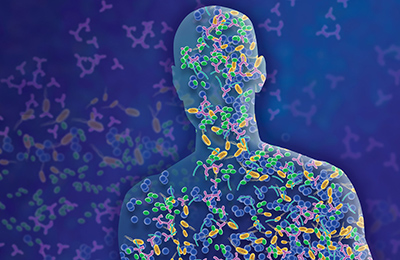New IPR Research: May 2021
Get all our news

This month's new research from IPR faculty covers the effect of exposure to immigrants on the academic outcomes of U.S.-born students, how the gut microbiome can improve health inequities, and whether a high school education has an impact on attitudes toward redistribution. The research also examines a bottom-up approach to welfare state scholarship and if people racialize risk-taking.
Education Policy
Immigrants and the Educational Performance of U.S. Born Students
Over the past 50 years, immigration rates in the United States have risen dramatically, and in 2015, almost one out of four public school students came from an immigrant household. In an IPR working paper, IPR economist David Figlio, finance professor and IPR associate Paola Sapienza, and their colleagues study the effect of exposure to immigrants on the academic outcomes of U.S.-born students. The researchers use unique administrative data linking population-level school records from the Florida Department of Education between 2002–2012 with birth records between 1994–2002. The school data contain the results of the Florida Comprehensive Assessment Test (FCAT) in reading and math administered annually to all students in 3rd to 10th grade, disciplinary incidents, country of origin, and the language spoken at home. This dataset allowed the researchers to find siblings who had different exposure to immigrant classmates, follow them over many years, and compare their test scores to one another. The researchers find that immigrant students had a positive impact on U.S.-born students’ academic outcomes, especially for students from disadvantaged backgrounds, including Black students and free-or-reduced-priced lunch eligible students. Immigrant students also do not negatively affect U.S.-born students even when the immigrants’ academic achievement is lower. Despite the fact that White native and affluent students are more likely to flee schools with larger concentrations of immigrants, more immigrant students are associated with higher achievement of U.S.-born students, which suggests the value of diversity in schools.
Social Disparities and Health
The Human Microbiome and Health Inequities
 Understanding the biological processes that cause and maintain socially driven health inequities is essential to address them. In an IPR working paper, anthropologist and IPR associate Katherine Amato, IPR anthropologist Christopher Kuzawa, and IPR health psychologist Greg Miller and their colleagues explore how taking into account the gut microbiome, the community of microbes that inhabits the human gastrointestinal tract, can improve health inequities. The gut microbiome is affected by diet, daily behaviors, and physical environments, and it influences nutrition, immune function, and behaviors in the body. Reduced microbiome diversity has been linked to chronic diseases, so alterations to the microbiome may be a way to prevent poor health outcomes. In a review of relevant studies, the researchers highlight the role the microbiome can play in perpetuating health disparities in undernutrition, obesity, asthma, neurological development, mental health, and COVID-19. For example, children who do not have access to fresh produce and other high-fiber foods will not have as diverse or resilient a microbiome as children who eat more nutritious diets. Each of these areas reveals that health disparities are caused not only by the socioeconomic, but factors such as discrimination and stress, which show up in the gut microbiome. To address health inequities, they suggest implementing policies such as encouraging breastfeeding and improving access to non-processed food in urban areas, both of which create more diversity in the microbiome and improve health. The researchers urge policymakers to incorporate knowledge about the microbiome in public health policies and suggest microbiome research aim for a broader understanding of what is microbially “healthy” or “unhealthy.”
Understanding the biological processes that cause and maintain socially driven health inequities is essential to address them. In an IPR working paper, anthropologist and IPR associate Katherine Amato, IPR anthropologist Christopher Kuzawa, and IPR health psychologist Greg Miller and their colleagues explore how taking into account the gut microbiome, the community of microbes that inhabits the human gastrointestinal tract, can improve health inequities. The gut microbiome is affected by diet, daily behaviors, and physical environments, and it influences nutrition, immune function, and behaviors in the body. Reduced microbiome diversity has been linked to chronic diseases, so alterations to the microbiome may be a way to prevent poor health outcomes. In a review of relevant studies, the researchers highlight the role the microbiome can play in perpetuating health disparities in undernutrition, obesity, asthma, neurological development, mental health, and COVID-19. For example, children who do not have access to fresh produce and other high-fiber foods will not have as diverse or resilient a microbiome as children who eat more nutritious diets. Each of these areas reveals that health disparities are caused not only by the socioeconomic, but factors such as discrimination and stress, which show up in the gut microbiome. To address health inequities, they suggest implementing policies such as encouraging breastfeeding and improving access to non-processed food in urban areas, both of which create more diversity in the microbiome and improve health. The researchers urge policymakers to incorporate knowledge about the microbiome in public health policies and suggest microbiome research aim for a broader understanding of what is microbially “healthy” or “unhealthy.”
Politics, Institutions, and Public Policy
A Bottom-Up Approach to Welfare State Scholarship
Because the welfare state is so vital to many low-income Americans for survival, the ways scholars choose to study it are crucial. In Perspectives on Politics, IPR political science professor Chloe Thurston and her colleagues suggest political scientists study the welfare state from the perspective of those who use the welfare system, rather than from the vantage point of policymakers and elite institutions. Research into the welfare state may change when marginalized groups are centered by creating policy innovation, providing new insights into how people perceive the role of government in their lives, and encouraging research into less studied types of policymaking. They highlight two examples—civil legal assistance and consumer credit—of welfare state politics that become visible when they are examined from the bottom up. The civil legal system plays a key role in navigating disputes over public benefits, such as preventing illegal evictions and foreclosure, and the researchers suggest that political scientists look at the ways marginalized groups have engaged with these political institutions and the political consequences of doing so. A bottom-up approach to credit may illuminate differences in outcomes from using credit programs, such as credit cards, check cashing, and payday loans, compared to credit used for homeownership and education. The researchers argue that to understand the welfare state, scholars must develop and test theories of the welfare state that are cognizant of the lived experiences of those who benefit from it. This may include changing how scholars study it, such as using more ethnographic and interview methods.
High School Reduces Support for Redistribution
In the British Journal of Political Science, IPR political scientist John Bullock proposes that a high-school education may impact economic attitudes, such as supporting welfare programs. To test his hypothesis, he looks at the connections between schooling laws, educational outcomes, and economic attitudes among adults required to attend school for 8–10 years or more than 10 years between 1910–2010. Using datasets from the American National Election Studies (ANES) and the General Social Survey (GSS), Bullock examines six attitudes about redistribution: redistribution from the rich to the poor, redistribution from high-income people to low-income ones, whether the government should ensure full employment and a good standard of living, government-provided health insurance, whether the government should do everything possible to improve the standard of living of all poor Americans, and welfare. He finds that an extra year of high school makes people's redistribution attitudes 3 to 6 percentage points more conservative on all items except welfare. Thus, increasing the strictness of schooling laws has a conservative effect on economic attitudes. To explain why, he investigates how education impacts people's self-interest, meaning the factors, such as income or employment, that decrease the chance that one will benefit from redistribution. Bullock's self-interest evaluation shows that high school increases income, employment, marriage, and verbal ability, which is consistent with the claim that education reduces dependence on redistributive policies.
Poverty, Race & Inequality
Do People Racialize Risk-Takers?
 In their working paper in PsyArXiv, Northwestern PhD candidate James Wages, IPR associate Sylvia Perry, and their co-authors examine how certain races are commonly associated with different risk-taking levels and the consequences of racializing risk-taking. Among 1,603 mostly White Americans and across five studies, the key findings show people envision risk-takers as Black more than White and associate reckless risk-takers with stereotypically Black traits. The fourth study demonstrated the costliest implications. The researchers showed people images of a supposedly responsible or reckless investor based on the mental images constructed from Study 3 and evaluated if people discriminated against an investor they thought looked reckless and was Black. Participants allocated more of their financial investment to the responsible risk-taker (racialized as White). The researchers argue that understanding an individual's thoughts about risk-takers is particularly important in professions that quickly analyze risks, such as healthcare, financial lending, and policing. For example, police officers typically use force under risk and pressure, and Black stereotypes may facilitate their discrimination. Or within healthcare, doctors tend to characterize Black patients as less likely to follow their recommendations and more likely to abuse drugs, which may lead to poorer quality of care.
In their working paper in PsyArXiv, Northwestern PhD candidate James Wages, IPR associate Sylvia Perry, and their co-authors examine how certain races are commonly associated with different risk-taking levels and the consequences of racializing risk-taking. Among 1,603 mostly White Americans and across five studies, the key findings show people envision risk-takers as Black more than White and associate reckless risk-takers with stereotypically Black traits. The fourth study demonstrated the costliest implications. The researchers showed people images of a supposedly responsible or reckless investor based on the mental images constructed from Study 3 and evaluated if people discriminated against an investor they thought looked reckless and was Black. Participants allocated more of their financial investment to the responsible risk-taker (racialized as White). The researchers argue that understanding an individual's thoughts about risk-takers is particularly important in professions that quickly analyze risks, such as healthcare, financial lending, and policing. For example, police officers typically use force under risk and pressure, and Black stereotypes may facilitate their discrimination. Or within healthcare, doctors tend to characterize Black patients as less likely to follow their recommendations and more likely to abuse drugs, which may lead to poorer quality of care.
Photo credits: Flickr
Published: May 27, 2021.


